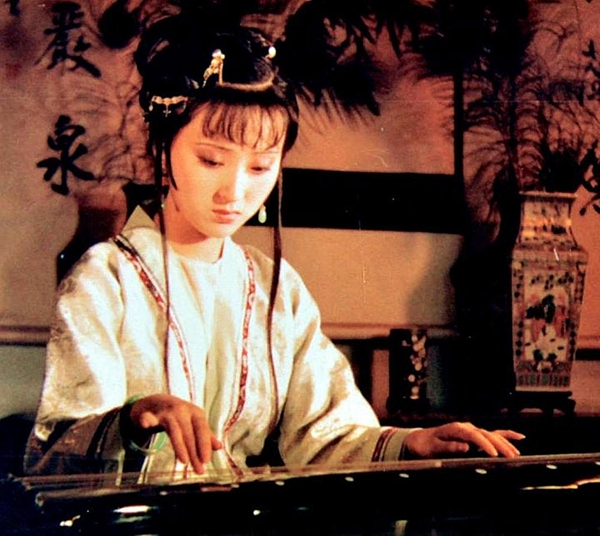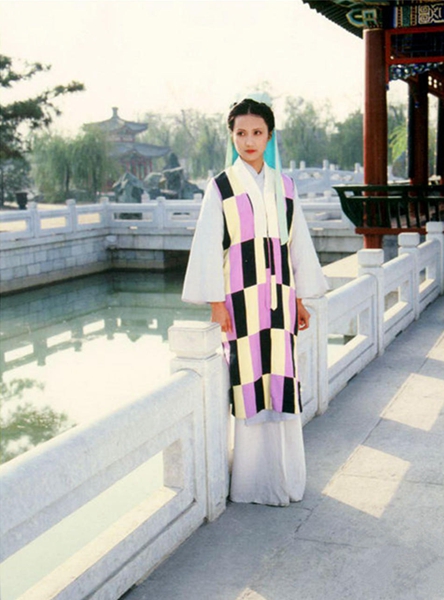《红楼梦》英译品读 (十七)
作者:王晓辉
说到古琴,人们很自然地会联想到俞伯牙和钟子期的故事。“伯牙善鼓琴,钟子期善听”,一曲《高山流水》,成就了千古知音的佳话。
佳话归佳话,现实生活中,知音还是少之又少。《红楼梦》第86回中,林黛玉给贾宝玉解释了半天古琴,从琴谱到心境,从旨趣到指法,但宝玉好像也没听出个子午卯酉来。

难道说,林黛玉一个“知音”也没有吗?不是的,有一个人,不仅能欣赏她的琴,还能听得懂她琴音中传递的心声。这个人就是妙玉。妙玉在小说中戏份并不多,但却在金陵十二钗正册中排在第六位。很多研究红学的人认为她出身高贵,与贾家渊源深厚,甚至有可能是皇家血脉,因宫廷斗争,寄养在贾府。脂砚斋点评妙玉时着意强调,“妙卿身世非凡,心性高深”。既然是如此身世背景,必定受过良好的教育,因此精通音律也就不足为奇了。
《红楼梦》第87回,宝玉送妙玉回栊翠庵,经过潇湘馆,忽听得叮咚的琴声,原来是林黛玉正在抚琴。宝玉道:“咱们去看他。”妙玉道:“从古只有听琴,再没有看琴的。” 宝玉笑道:“我原说我是个俗人。”说着,二人走至潇湘馆外,在山子石上坐着静听,甚觉音调清切。只听得低吟道:
风萧萧兮秋气深,美人千里兮独沉吟。
望故乡兮何处?倚栏杆兮涕沾襟。
歇了一回,听得又吟道:
山迢迢兮水长,照轩窗兮明月光。
耿耿不寐兮银河渺茫,罗衫怯怯兮风露凉。
又歇了一歇。妙玉道:“刚才‘侵’字韵是第一叠,如今‘阳’字韵是第二叠了。咱们再听。”里边又吟道:
子之遭兮不自由,予之遇兮多烦忧。
之子与我兮心焉相投,思古人兮俾无尤。
妙玉道:“这又是一拍。何忧思之深也!”宝玉道:“我虽不懂得,但听他声音,也觉得过悲了。”里头又调了一回弦。妙玉道:“君弦太高了,与无射律只怕不配呢。”
里边又吟道:
人生斯世兮如轻尘,天上人间兮感夙因。
感夙因兮不可惙,素心如何天上月!
妙玉听了,呀然失色道:“如何忽作变徵之声?音韵可裂金石矣!只是太过。”宝玉道:“太过便怎么?”妙玉道:“恐不能持久。”正议论时,听得君弦“蹦”的一声断了。妙玉站起来,连忙就走。宝玉道:“怎么样?”妙玉道:“日后自知,你也不必多说。”竟自走了。

闵福德(John Minford)的译文:
They had now reached a rockery close to the Naiad's House. They sat down and listened in silence, touched by the poignancy of the melody. Then a murmuring voice began to chant:
'Autumn deepens, and with it
the wind's bitter moan.
My lover is far away;
I mourn alone.
Gazing in vain
For a glimpse of home,
I stand at my balcony.
Tears bedew my gown.’
After a brief pause, the chant began again:
'Hills and lakes melt
Into distant night.
Through my casement shines
the clear light
Of the moon
And the sleepless Milky Way.
My thin robe trembles
As wind and dew alight.'
There was another brief pause. Adamantina said to Bao-yu:
'The first stanza rhymed on "moan", the second on "night". I wonder how the next rhyme?'
The chant began again from within:
'Fate denies you freedom,
holds you bound;
Inflicting on me too
a heavy wound.
In closest harmony
Our hearts resound;
In contemplation of the Ancients
Is solace to be found.'
'That must be the end of the third stanza,' said Adamantina. 'How tragic it is!'
'I don't know anything about music,' said Bao-yu. 'But just from the way she sang, I found it terribly sad.'
There was another pause, and they heard Dai-yu tuning her Qin.
'That tonic B-flat of hers is too sharp for the scale,' commented Adamantina.
The chant began again:
'Alas! this particle of dust,
the human soul,
Is only playing out
a predetermined role.
Why grieve to watch
The Wheel of Karma turn?
A moonlike purity remains
My constant goal.'
As she listened, Adamantina turned pale with horror.
'Just listen to the way she suddenly uses a sharpened fourth there! Her intonation is enough to shatter bronze and stone! It's much too sharp!'
'What do you mean, too sharp?' asked Bao-yu.
'It will never take the strain.'
As they were talking, they heard a sudden twang and the tonic string snapped. Adamantina stood up at once and began to walk away.
'What is the matter?' asked Bao-yu.
'You will find out in time. Please don't say anything about this.'
She walked off, leaving Bao-yu in a state of great confusion.
贾宝玉不懂琴,所以他要进去看林黛玉弹琴;妙玉深谙琴理,知道只有在一旁静听,才能更好地体会琴中的韵味,这是典型的“外行看热闹,内行听门道”。
在听到林黛玉吟出第二叠后,妙玉立即说出“刚才‘侵’字韵是第一叠,如今‘阳’字韵是第二叠了”,足见其对音律之敏感。但是,妙玉这句话翻译起来难度可是相当大的。闵福德是这样翻译的:The first stanza rhymed on "moan", the second on "night". I wonder how the next rhyme?
先说“叠”字的翻译。“叠”的意思是乐曲的重复演奏,如古曲《阳关三叠》,因为要反复吟唱三次故称之为“三叠”。“Stanza”在牛津字典中的解释是a group of lines in a repeated pattern that form a unit in some types of poem,用来翻译“叠”字,恰到好处。
但接下来的“‘侵’字韵”和“‘阳’字韵”可就麻烦大了。中国古人作诗有严格的押韵要求,为了方便说某个韵,就选一个字为代表,如“侵”字代表和“侵”同韵的所有汉字的这个韵,“阳”字韵也是如此。可是,英语中没有这种讲究,无奈之下,闵福德只好先按英诗的䪨律翻译,然后将译诗中的第一个韵脚拿出来,替代“侵”字和“阳”字,于是,就成了the first stanza rhymed on "moan"(第一叠译文中moan,alone,gown同韵),the second on "night"(第二叠译文中night,light,alight 同韵)。这种灵活变通的译法很容易为外国读者所接受,但前提是诗歌的翻译必须合辙押韵,所以,没有相当的功力是做不到的。
听完了黛玉弹奏的第三叠,妙玉道:“君弦太高了,与无射律只怕不配呢。”
什么是君弦呢?君弦是古琴最外面的一根,也称一弦。君弦是定音高的,君弦高了,其它弦也会跟着高上去。中国古代音律分为十二律,奇数为阳律,偶数为阴律,“无射”是六个阳律的最后一个,如果换算成西洋音乐的十二绝对音高的话,应该是降B调,英文是“B-flat”。所以,闵福德将这句话译成:'That tonic B-flat of hers is too sharp for the scale,' commented Adamantina。
到了最后一段,也就是第四叠,林黛玉的心情愈加悲切,琴作“变徵之声”,妙玉刚说出“只是太过,恐不能持久”,那君弦便“蹦”的一声断了。一般来说,君弦是最粗最结实的,由九九八十一根蚕丝编成,以林黛玉的纤纤玉指,很难弹断。作者之所以写君弦崩断,更多地是用来暗示林黛玉的命运。妙玉所说的“变徵之声”是出自《史记·刺客列传》的一个成语,意思是声音高亢悲壮。“徵”是中国古代五个音阶(宫、商、角、徵、羽)中的第四个,徵调变化,声音悲壮。闵福德将“变徵之声”译为sharpened fourth(拔高了的第四个音阶),将“君弦”译为tonic string(主音之弦),很值得我们认真体会。
《红楼梦》中有太多的中国文化的特殊表达,连我们中国人自己也未必能领悟到位,而霍克斯和闵福德却能优雅准确地用英文呈现给外国读者,殊为不易。他们的翻译有如此成就,除了母语优势、汉学功底、博学勤奋之外,虚心求教也是他们取得成功的重要原因之一。闵福德在《红楼梦》英译本(The Story of the Stone)第四册前言中提到,他曾向多位专家请教关于占卜、围棋和音乐等方面的专业词汇,帮助过他的人中甚至还包括杨宪益和吴世昌这样的翻译和文化大家。(I am grateful to Professor Ting Su of Los Angeles for helping me with fortune-telling; to Professor Matsudaira Chiaki of Kyoto University, and Professor Kakei Fumio of Ritsumeikan University, Kyoto, for help with Go terminology; to Dr Laurence Picken for help with musical terminology... Since my arrival in China, I have been greatly helped by Professor Yang Xianyi and Wu Shichang.)
“转益多师是汝师”。大师级人物尚能如此,我等后学晚辈,更应勤学多问,无负今日。
 0
0 






8eaf5b43-c1e4-4a26-a147-eef1932de85c.jpg)
Go to Forum >>0 Comment(s)